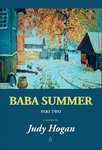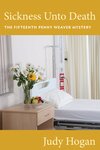


Moncure resident and veteran author Judy Hogan has recently released two books, each the latest of a series: “Baba Summer, Part Two,” a memoir of her time in Russian, and a work of fiction, “Sickness Unto Death,” the 15th in her “Penny Weaver” series. This week, we spoke with Hogan about her works and upcoming writing projects.
You recently published two new books, each a part of a series, each very different. Let’s start with the second in your memoirs of your experiences in Russia from 1990-1996. It’s called “Baba Summer, Part 2.” What does the name “Baba Summer” refer to, and what took you there to Russia in the first place?
“Baba Summer” means “Grandmother Summer” in Russian. A baba is an older woman. They think of women as becoming a baba at about age 40. It’s the way they speak of summer — like weather after there had been some frost, so like our Indian Summer.
I was very concerned about the U.S. getting into war. And we had a new Sister Cities connection with the Russian city of Kostroma, their province a lot like our North Carolina, a fairly large city in a largely rural state in 1989, when I first met the Mayor Korobov of Kostroma who was in Durham to sign the new Sister Cities connection. I saw the Russians and the host Americans walking toward the Durham County Library and called out, “Welcome, Russians,“ and the mayor and his interpreter came over to talk to me. Later I learned that he wanted to talk to me because I wasn’t part of the official hosting committee. He gave me his card and I gave him my new book on doing classes in the library.
I was amazed at his friendliness, and told everyone, “The Russians are friendly.” Then I heard from the head of the Writers Organization in Kostroma, Mikhail Bazankov, and he suggested we do writer exchanges. I went first with my son Tim in 1990; he came here in 1992, and I went to Russia in the summer of 1992, which is the subject matter of Baba Two. I came to love the Russian people I met, and Mikhail and I worked well together, did several exchanges and published a book called Earth and Soul, NC Poets in a dual language edition.
You did a lot of journaling and writing during that time. This new book focuses on your experiences with Russian writers and painters. How much of it was drawn directly from your writing during that period – or did you re-write as you prepared this book?
I kept a journal throughout that time, but sometimes, afterwards I added more detail, for instance my train ride from Moscow to Sharya, a city farther east than Kostroma, and the kindness of my seatmates.
The book includes poems you wrote during that time in your life. What are your thoughts and impressions as you read those poems today?
I see those poems as some of my best poetry. I’d like to publish the whole series of poems from 1992 in its own book, but right now I want to get the four books in print. Two more are ready now: Frost and Sun, Parts One and Two.
What do you hope readers will gain from sharing your experience with them in this book?
I’m sad that Russia on the political side has become our enemy. I have such dear friends there, and with many I still correspond. I did learn enough Russian to be able to live there in my own borrowed apt, and do my own shopping, and I taught in the English Dept in the fall of 1995.
Do you have a timetable for the remaining two books in the series?
I hope by 2022 to have them all in print.
Your other new book, published last month, is the 15th in the “Penny Weaver” mystery series, entitled “Sickness Unto Death.” For those unfamiliar with the series (loosely based in Chatham County), tell us about Penny and the series…
Penny Weaver is me in many ways. She enjoys people, she works against environmental pollution. She takes up community issues which have been part of my life (e.g., formaldehyde poisoning, racism, teaching in a black college, teenage sex, abuse in a hospital, fracking, coal ash dumping). I’ve written 17, and the next two are about coal ash, and we finally won that battle. “Sickness” is about patient abuse on a stroke ward.
The novel was actually written six years ago, before the coronavirus pandemic, but addresses a medical crisis. What else can you share about the storyline of this book?
I got an idea from Luci Zahray, so at the mystery conference, Malice Domestic, she taught us about poisons. I was disappointed in my own hospital experience, and wrote about that, too.
What other storylines do you have planned for Penny?
Two more, both about the coal ash fight. I was the chair in reality for this fight from 2015-2020.
The past year has been a challenging one in many respects. What has it been like for you?
Not too bad. I’m nearly 84, so somewhat limited. I go out for dentist, doctor, essentials, My son Tim does the shopping, sees to the hens. I have a helper three days a week, and we’re planning a vegetable garden this year. We are both fully vaccinated.
Are you still teaching creative writing?
I teach two classes in the fall and winter, one in poetry, and one in stories, fiction or memoir. the poetry class in September will read the new book about Native Nations edited by Joy Harjo. The story class will read Louise Penny’s The Better Man. Writers improve faster by reading good books.
What else keeps you busy in Moncure these days?
I try not to overdo it, but I’m basically healthy. I read for pleasure, too. over the pandemic time I re-read Trollope’s Barchester and Palliser series novels
Hogan will perform a reading on April 27 via Crowdcast at the Page158 books in Wake Forest with two others published by Adelaide books, Charles Fiore and Wim Coleman. The virtual event begins at 6:30 p.m. For information or to attend, go to https://www.crowdcast.io/e/an-evening-with-adelaide/register or https://www.page158books.com/event/author-roundtable-adelaide-press.